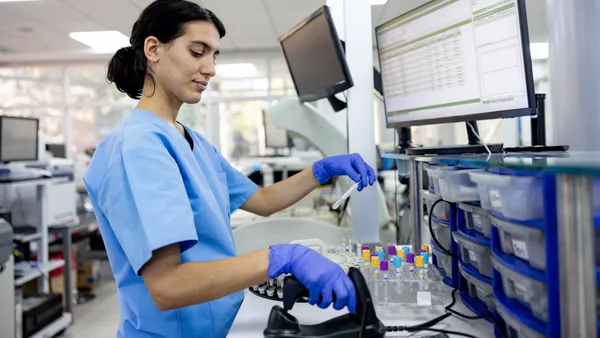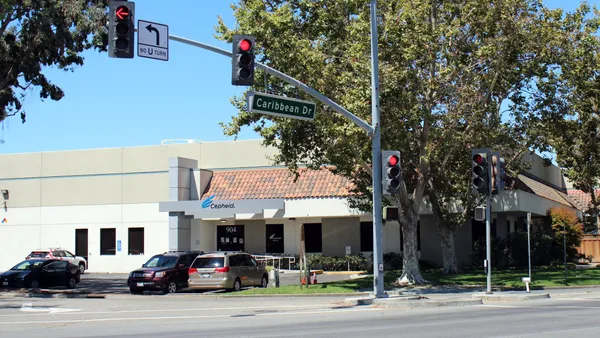Dive Brief:
-
Adjusted operating income at LabCorp Diagnostics dropped by 22% in the fourth quarter as reimbursement changes and other factors took a bite out of its profitability.
-
LabCorp calculated the Protecting Access to Medicare Act wiped $18 million off its operating income and contributed to declining sales at the diagnostics unit. The company is actively lobbying to reverse the cuts on Capitol Hill.
-
Despite the difficulties, the diagnostics unit hit the upper end of the revised revenue growth guidance LabCorp issued when the headwinds became apparent late last year.
Dive Insight:
LabCorp primed observers to expect a tricky fourth quarter at its diagnostics unit when it published revised full-year guidance in November. Faced with an unexpected hit to diagnostic volumes, LabCorp knocked around one percentage point off its revenue forecast for the unit and lowered the earnings outlook for the overall business.
Months later, the fourth quarter results show LabCorp correctly reduced its guidance. Full year revenue growth at the diagnostics unit and the broader business both came within the targeted range, as did adjusted earnings per share.
LabCorp's inability to beat the targets it set in November stems from the anticipated weakness at the diagnostics business. While LabCorp's Covance Drug Development unit closed out 2018 with another quarter of double-digit growth, sales at the larger diagnostics business fell 3%, despite getting a 1% tailwind from acquisitions and other factors.
The tailwind was more than offset by LabCorp's disposition of its U.S. forensics business, which caused a 2.6% hit to diagnostic unit sales, and the impact of PAMA. The reimbursement legislation wiped 1% off the sales growth figure and decreased revenue per requisition by the same amount.
LabCorp had anticipated facing such headwinds in the fourth quarter but the impact of PAMA has been more significant than initially thought. While the reimbursement reductions directly affected Medicare, Medicaid plans have cut their rates in line with the PAMA changes.
"It has exacerbated the impact of PAMA," LabCorp CEO Dave King said on a fourth quarter results conference call with investors. The one positive is that King does not see evidence that the PAMA cuts have "bled over into managed care."
LabCorp expects the trend to continue into 2019, leading it to factor a $30 million ex-Medicare PAMA headwind into its outlook for the year. With LabCorp also contending with competition from Quest Diagnostics for UnitedHealth's business, the stage is set for a tough 2019.
That is reflected in LabCorp's guidance. LabCorp expects sales at its diagnostics unit to fall by 2% to 4% in 2019, despite it forecasting organic volume growth and a favorable test mix. PAMA is expected to offset those positives and have a negative 1.6% impact on full-year diagnostic revenue. LabCorp also plans to increase spending on cybersecurity by $25 million.
While the 2019 forecast is poor by historical standards, it provides clarity about how bad LabCorp expects things to get. King sought to provide reassurance by saying that the "underlying core [diagnostic] business is stable" and that volume in January, the first month since the loss of United exclusivity, "was consistent with our expectations."
Aspects of the upheaval may create opportunities, too, with King noting that PAMA could lead to "attractive tuck-in lab opportunities" as smaller clinical laboratories struggle under margin pressure.










